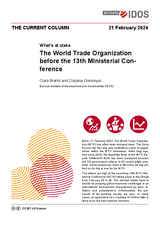What's at stake
The World Trade Organization before the 13th Ministerial Conference
Brandi, Clara / Zoryana OlekseyukThe Current Column (2024)
Bonn: German Institute of Development and Sustainability (IDOS), The Current Column of 21 February 2024
Bonn, 21 February 2024. The World Trade Organization (WTO) has often been declared dead. The Doha Round, the first and only multilateral round of negotiations within the WTO framework, failed long ago. And since 2019, the Appellate Body of the WTO Dispute Settlement Body has been paralysed because the US government refuses to fill vacant judge positions. Some people say: there is life in the old dog yet. And so far this is true for the WTO.
The stakes are high at the upcoming 13th WTO Ministerial Conference (MC13) taking place in Abu Dhabi from February 26 to 29. The member states have to decide on pressing global economic challenges in an international environment characterised by wars, inflation, and protectionism. Unfortunately, the prospects of far-reaching results are poor. In many cases, an agreement on a roadmap for further talks is likely to be the best possible outcome.
The most likely candidate for success is a complemented Agreement on Fisheries Subsidies. Much of the text is settled. The aim is to introduce disciplines for eliminating subsidies that encourage overfishing or overcapacity. But even here, there is still considerable disagreement, for example on possible exemptions.
A big bone of contention is agriculture. The sticking point is the issue of public stockholding for the purpose of food security. For years, India has been calling for such subsidised stocks to be allowed. Others fear that public stockholding not only distorts trade but also affects the food security of other members. In view of the upcoming parliamentary elections in India, these discussions are unlikely to be resolved at the MC13.
The current draft text on the reform of the WTO dispute settlement system contains many good approaches, but still no proposal for the main point of contention: a relaunched review or appeal mechanism, as proposed by the EU, for example. This strongly suggests that the text will not be signed at the MC13. In particular, the United States will not agree to any mechanism that could confirm WTO rulings running counter to US interests during the presidential election year.
These three key issues illustrate that major agreements are hardly within reach. This also applies to other important issues on the agenda, such as e-commerce or intellectual property rights. And still: The WTO's overall record is much better than its reputation.
Firstly, the WTO is and remains the guardian of rules-based world trade. It provides not only a forum for setting new rules for world trade but also monitors their compliance. The WTO also acts as an important trade policy think tank that counters the populist cries of "our nation first" by applying data analysis. These functions of the WTO are even more crucial in times of geopolitical tensions.
Secondly, the WTO member states have achieved a number of important successes in recent years regarding new rules for the global economy. This has often happened under the radar of the wider public. Since 2020, for example, the Trade and Environmental Sustainability Structured Discussions (TESSD) have been underway in the WTO to use trade policy as a lever for better environmental protection, for example by promoting circular economy or avoiding plastic waste. In order to further develop the WTO rules, some members focus on plurilateral agreements. In July 2023, more than two-thirds of the WTO members concluded negotiations on the Investment Facilitation for Development (IFD) Agreement, which is to be adopted in Abu Dhabi. Recent research shows that particularly developing countries can benefit from this agreement.
Thirdly, the WTO Ministerial Conferences have repeatedly proved significant steps forward despite all the challenges. At the Ministerial Conference in Bali in 2013, for example, the Trade Facilitation Agreement (TFA) was adopted, which simplifies and harmonises international trade. In Nairobi in 2015, the WTO members decided to eliminate agricultural export subsidies, which distorted agricultural markets over decades at the expense of many developing countries. In 2022, the so-called TRIPS waiver - a waiver for intellectual property protection under the WTO agreement on trade-related aspects of intellectual property rights (TRIPS) - was adopted to enable developing countries to manufacture and distribute COVID-19 vaccines.
The member states must therefore not abandon the WTO. Further marginalisation of the multilateral trading system harms all societies. It weakens smaller and poorer states in particular, which have a comparatively strong voice in the WTO due to the "one country, one vote" principle. This makes it even more important to push ahead with the reform of the WTO.
Germany and the EU must do their part to strengthen the WTO. This should be driven forward by forging new coalitions with countries from the Global South. In addition, Germany and the EU should focus on providing substantial support for the implementation of WTO rules in poorer countries. This will be essential for investment facilitation, for example, so that all countries benefit as much as possible from the new agreement. Finally, innovative ideas are still needed to achieve progress. The WTO is dead, long live the WTO!



